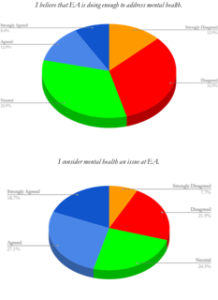Mary Cipperman ’21
The National Alliance on Mental Health Illness (NAMI) reports that mental illness affects one in five teens. An influx of college dropouts, school shootings, and teen suicides have brought these issues to the forefront of educational reform. Mental illnesses, including eating disorders, anxiety, depression, bipolarism, ADHD, and others, pose a risk. While the Episcopal Academy is an elite institution, it is also, at its core, a community. These matters threaten EA as they do the wider nation. The administration has responded accordingly, providing increased accommodations, counseling, and education for mental illness. Still, many students agree that further improvement is necessary.

Photo courtesy of Mary Cipperman ’21
5.8% of the student body surveyed agree or strongly agree that they consider mental health an issue at EA, but 29.6% do not. One student comments, “I do not believe [mental health] is a prevalent problem. If someone needs help, EA has the resources to fully help that individual.” As the number clearly demonstrates, this opinion is a minority. Only 21.6% percent of students believe that EA is doing enough to address the issue.
Statistics match this sentiment. The prevalence of diagnosed individuals in the EA Upper School student body is approximately the same as in national groupings.
What’s concerning, however, is that a majority of students (62.8%) reported having experienced anxiety, depression, or another mental illness. This is both higher than national averages (cited above) and illuminates the approximately 40% of students who may remain undiagnosed, but require assistance.
Several students suggested that the cause of these high numbers is competitive academics. One student’s comment was that “[EA maintains] a very stressful environment, with lots of pressure on students.” Two others comment on the heavy workload. Another asserts that the environment around grades at EA has driven her/him almost to hospitalization.
Unfortunately, students note pressures exceeding the classroom. One student thinks that “Episcopal makes students believe that in order to succeed, they must excel in academics while being a three-sport varsity athlete.” Another student personally feels that a GPA below 3.5 indicates failure, taking a toll on their own mental health.
One student, who experiences frequent panic attacks in class explains a feeling of ostracism due to the absence of education on anxiety, depression, OCD, and bulimia.
Despite a rigorous academic and extracurricular program, EA has attempted to address these issues. Upper School Psychologist Nicole Chaikin provides individual and group counseling for social, behavioral, and emotional problems. She works with student advisors, deans, and parents, as well as external sources, to provide students with adequate guidance. She explains that her primary goal is to provide a “safe, open space.” She believes EA can best improve through community integration.
The Upper School Nurse Laura Hurst aids students as well. She collaborates with faculty and administrators to refer students to appropriate resources. She explains, “I also work with students to promote healthy coping habits, including exercise, sleep, hygiene, and nutrition.”
Still, students and faculty are taking action to improve these existing health programs. A student-led service group, partnered with the Global Youth Leadership Institute (GYLI), plans to propose reforms at EA. They wish to increase the accessibility of resources- namely, counseling- and the prevalence of speakers on mental health. Tracy Rosenberg ‘21, one of the students, says she hopes to lessen the “stigma around mental health.” Another, Laura Patterson ‘21, says, “We have the resources and we have demand for them, we just to make it a more open system.” The overall goal is to increase awareness.
Michael Letts, Head of Upper School, explains that administration hears these groups and wants to improve. He hopes that learning accommodations and the changed schedule will help students. This year, administration has increased hours for Middle and Upper School psychologists. They also implemented a new ninth-grade health seminar, which will target workshop skills and time management through the advisory program.
Despite these reforms, mental illness continues to gain prevalence. Letts concludes: “I think it’s something that’s been neglected in schools for a long time. We have a lot going on, but we can always do more.”
Dr. Chaikin is available during school hours in the Upper School Office. She encourages any high-schoolers to email her at nchaikin@episcopalacademy.org. If any student needs, or may need, assistance, contact her, a form dean, or an advisor.